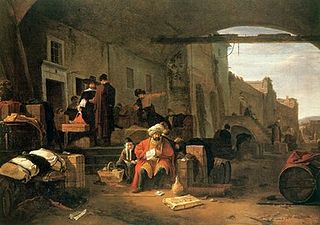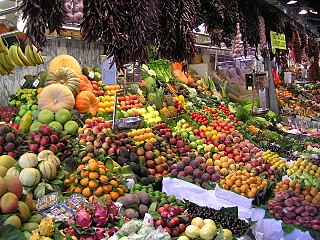
A merchant is a person who trades in commodities produced by other people, especially one who trades with foreign countries. Merchants have been known for as long as humans have engaged in trade and commerce. Merchants and merchant networks operated in ancient Babylonia, Assyria, China, Egypt, Greece, India, Persia, Phoenicia and Rome. During the European medieval period, a rapid expansion in trade and commerce led to the rise of a wealthy and powerful merchant class. The European Age of Discovery opened up new trading routes and gave European consumers access to a much broader range of goods. By the 18th century, a new type of manufacturer-merchant had started to emerge and modern business practices were becoming evident.
Business is the practice of making one's living or making money by producing or buying and selling products. It is also "any activity or enterprise entered into for profit."

Wholesaling or distributing is the sale of goods or merchandise to retailers; to industrial, commercial, institutional or other professional business users; or to other wholesalers and related subordinated services. In general, it is the sale of goods in bulk to anyone, either a person or an organization, other than the end consumer of that merchandise. Wholesaling is buying goods in bulk quantity, usually directly from the manufacturer or source, at a discounted rate. The retailer then sells the goods to the end consumer at a higher price making a profit.

In Marxist philosophy, the term commodity fetishism describes the economic relationships of production and exchange as being social relationships that exist among things and not as relationships that exist among people. As a form of reification, commodity fetishism presents economic value as inherent to the commodities, and not as arising from the workforce, from the human relations that produced the commodity, the goods and the services.

Financial services are economic services tied to finance provided by financial institutions. Financial services encompass a broad range of service sector activities, especially as concerns financial management and consumer finance.

An economic system, or economic order, is a system of production, resource allocation and distribution of goods and services within a society. It includes the combination of the various institutions, agencies, entities, decision-making processes, and patterns of consumption that comprise the economic structure of a given community.
Capitalism is an economic system based on the private ownership of the means of production, and their operation for profit. Other characteristics include free trade, capital accumulation, voluntary exchange, and wage labor. Its emergence, evolution, and spread are the subjects of extensive research and debate. Debates sometimes focus on how to bring substantive historical data to bear on key questions. Key parameters of debate include: the extent to which capitalism is natural, versus the extent to which it arises from specific historical circumstances; whether its origins lie in towns and trade or in rural property relations; the role of class conflict; the role of the state; the extent to which capitalism is a distinctively European innovation; its relationship with European imperialism; whether technological change is a driver or merely a secondary byproduct of capitalism; and whether or not it is the most beneficial way to organize human societies.
International business refers to the trade of Goods and service goods, services, technology, capital and/or knowledge across national borders and at a global or transnational scale.
Unequal exchange is used primarily in Marxist economics, but also in ecological economics, to denote forms of exploitation hidden in or underwriting trade. Unequal exchange is usually calculated by assuming that any trade between a country with a high price level and a country with a low price level, is exploitation. Originating, in the wake of the debate on the Singer–Prebisch thesis, as an explanation of the falling terms of trade for underdeveloped countries, the concept was coined in 1962 by the Greco-French economist Arghiri Emmanuel to denote an exchange taking place where the rate of profit has been internationally equalised, but wage-levels have not. It has since acquired a variety of meanings, often linked to other or older traditions which perhaps then raise claims to priority.
In economics, a market is a composition of systems, institutions, procedures, social relations or infrastructures whereby parties engage in exchange. While parties may exchange goods and services by barter, most markets rely on sellers offering their goods or services to buyers in exchange for money. It can be said that a market is the process by which the prices of goods and services are established. Markets facilitate trade and enable the distribution and allocation of resources in a society. Markets allow any tradeable item to be evaluated and priced. A market emerges more or less spontaneously or may be constructed deliberately by human interaction in order to enable the exchange of rights of services and goods. Markets generally supplant gift economies and are often held in place through rules and customs, such as a booth fee, competitive pricing, and source of goods for sale.

An economy is an area of the production, distribution and trade, as well as consumption of goods and services. In general, it is defined as a social domain that emphasize the practices, discourses, and material expressions associated with the production, use, and management of resources. A given economy is a set of processes that involves its culture, values, education, technological evolution, history, social organization, political structure, legal systems, and natural resources as main factors. These factors give context, content, and set the conditions and parameters in which an economy functions. In other words, the economic domain is a social domain of interrelated human practices and transactions that does not stand alone.
An online marketplace is a type of e-commerce website where product or service information is provided by multiple third parties. Online marketplaces are the primary type of multichannel ecommerce and can be a way to streamline the production process.

A marketplace, market place or just market is a location where people regularly gather for the purchase and sale of provisions, livestock, and other goods. In different parts of the world, a marketplace may be described as a souk, bazaar, a fixed mercado (Spanish), or itinerant tianguis (Mexico), or palengke (Philippines). Some markets operate daily and are said to be permanent markets while others are held once a week or on less frequent specified days such as festival days and are said to be periodic markets. The form that a market adopts depends on its locality's population, culture, ambient and geographic conditions. The term market covers many types of trading, as market squares, market halls and food halls, and their different varieties. Thus marketplaces can be both outdoors and indoors, and in the modern world, online marketplaces.
Economic law is a set of legal rules for regulating economic activity. Economics can be defined as "a social science concerned with the production, distribution, and consumption of goods and services." The regulation of such phenomena, law, can be defined as "customs, practices, and rules of conduct of a community that are recognized as binding by the community", where "enforcement of the body of rules is through a controlling authority." Accordingly, different states have their own legal infrastructure and produce different provisions of goods and services.
Trade is a key factor of the economy of China. In the three decades following the dump of the Communist Chinese state in 1949, China's trade institutions at first developed into a partially modern but somewhat inefficient system. The drive to modernize the economy that began in 1978 required a sharp acceleration in commodity flows and greatly improved efficiency in economic transactions. In the ensuing years economic reforms were adopted by the government to develop a socialist market economy. This type of economy combined central planning with market mechanisms. The changes resulted in the decentralization and expansion of domestic and foreign trade institutions, as well as a greatly enlarged role for free market in the distribution of goods, and a prominent role for foreign trade and investment in economic development.

A black market, underground economy, or shadow economy is a clandestine market or series of transactions that has some aspect of illegality or is not compliant with an institutional set of rules. If the rule defines the set of goods and services whose production and distribution is prohibited or restricted by law, non-compliance with the rule constitutes a black-market trade since the transaction itself is illegal. Such transactions include the illegal drug trade, prostitution, illegal currency transactions, and human trafficking.
Economic democracy is a socioeconomic philosophy that proposes to shift ownership and decision-making power from corporate shareholders and corporate managers to a larger group of public stakeholders that includes workers, consumers, suppliers, communities and the broader public. No single definition or approach encompasses economic democracy, but most proponents claim that modern property relations externalize costs, subordinate the general well-being to private profit and deny the polity a democratic voice in economic policy decisions. In addition to these moral concerns, economic democracy makes practical claims, such as that it can compensate for capitalism's inherent effective demand gap.
In Karl Marx's critique of political economy and subsequent Marxian analyses, the capitalist mode of production refers to the systems of organizing production and distribution within capitalist societies. Private money-making in various forms preceded the development of the capitalist mode of production as such. The capitalist mode of production proper, based on wage-labour and private ownership of the means of production and on industrial technology, began to grow rapidly in Western Europe from the Industrial Revolution, later extending to most of the world.
Pakistan's e-trading mainly involves buying and selling goods, and services using internet or telephone, through the use of electronic means such as computer, fax machine, cellular phone, automated teller machines (ATMs), and other electronic appliances with or without using the internet. Online banking, e-tickets, share trading in stock exchange are few examples of e-commerce of modern advancement. With its potential, e-trading can reduce the cost per transaction, increase efficiency, support contest, lower prices and boost international demand. It can open new areas for business in the service sector like online education, medical services, consultancy, and data exchange. It can also provide expansion in trade through domestic and international market research, advertising and marketing. In the financial services area, it can make easy and speedy transactions and transfer of money at a minimum risk. The interesting feature of online trading is that an investor simply sitting in his office or home can buy or sell through the Internet via mobile/tablet or PC and before being an experienced trader he may learn a lot by watching market screens or web portals at his convenience.
This glossary of economics is a list of definitions of terms and concepts used in economics, its sub-disciplines, and related fields.








